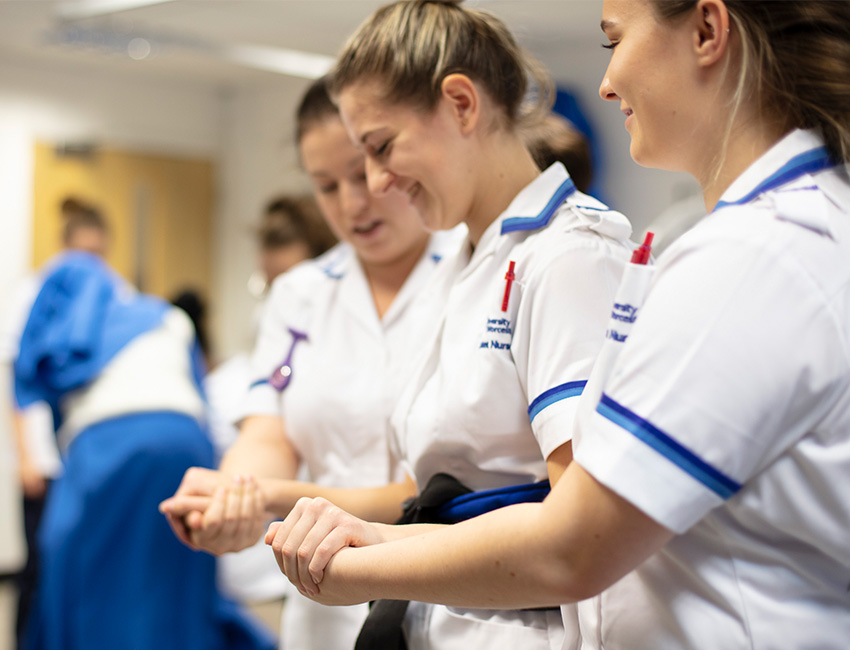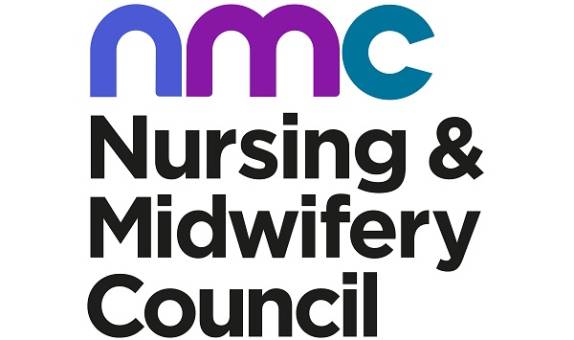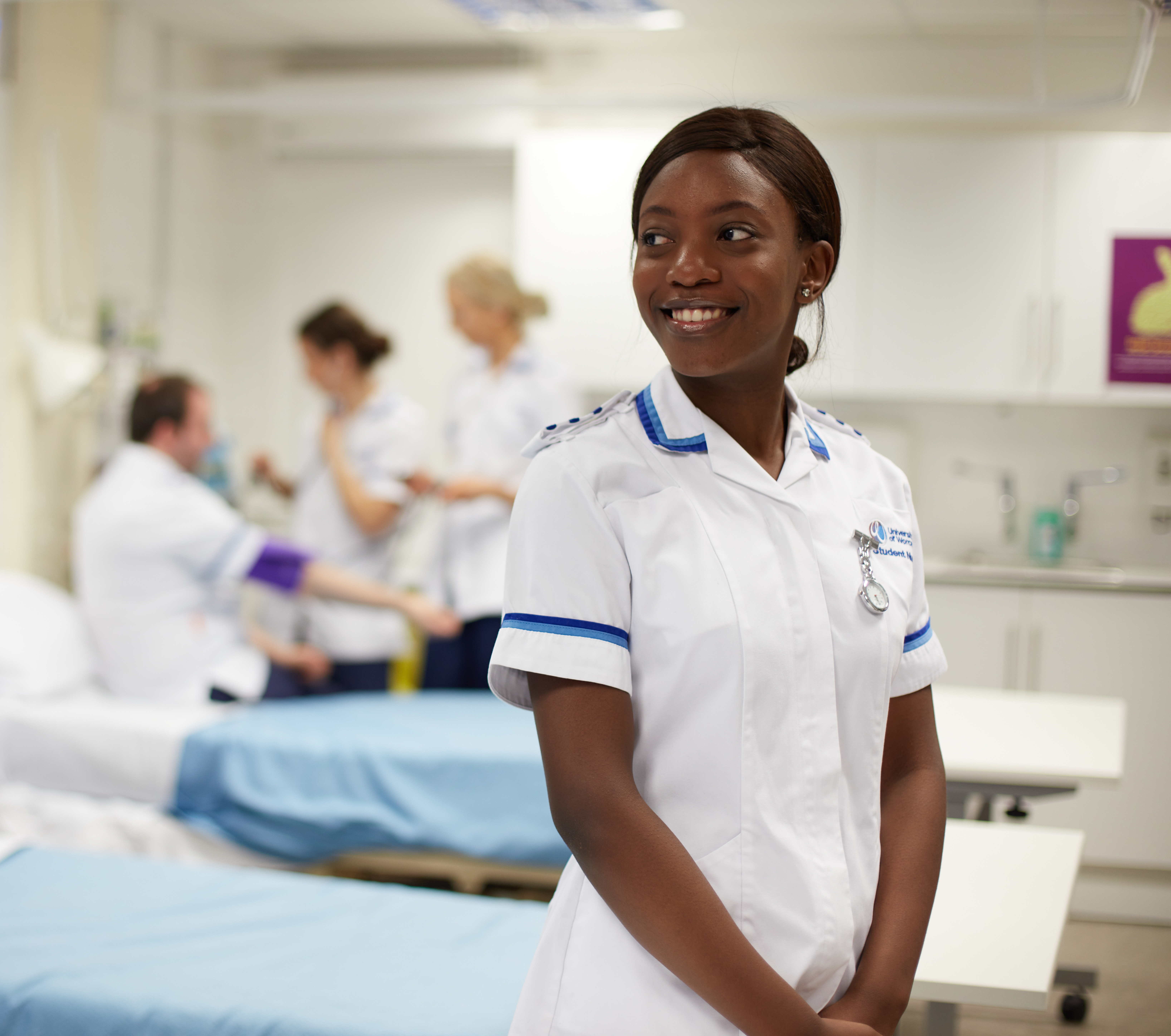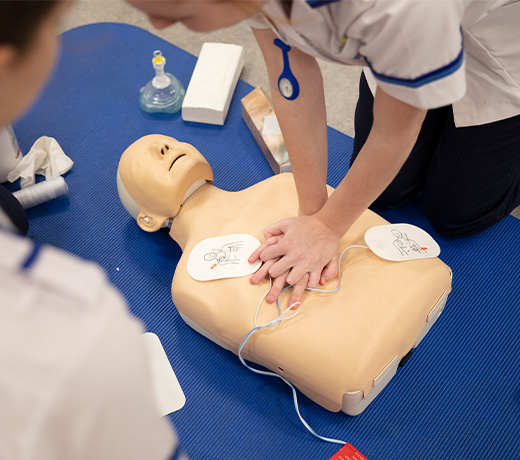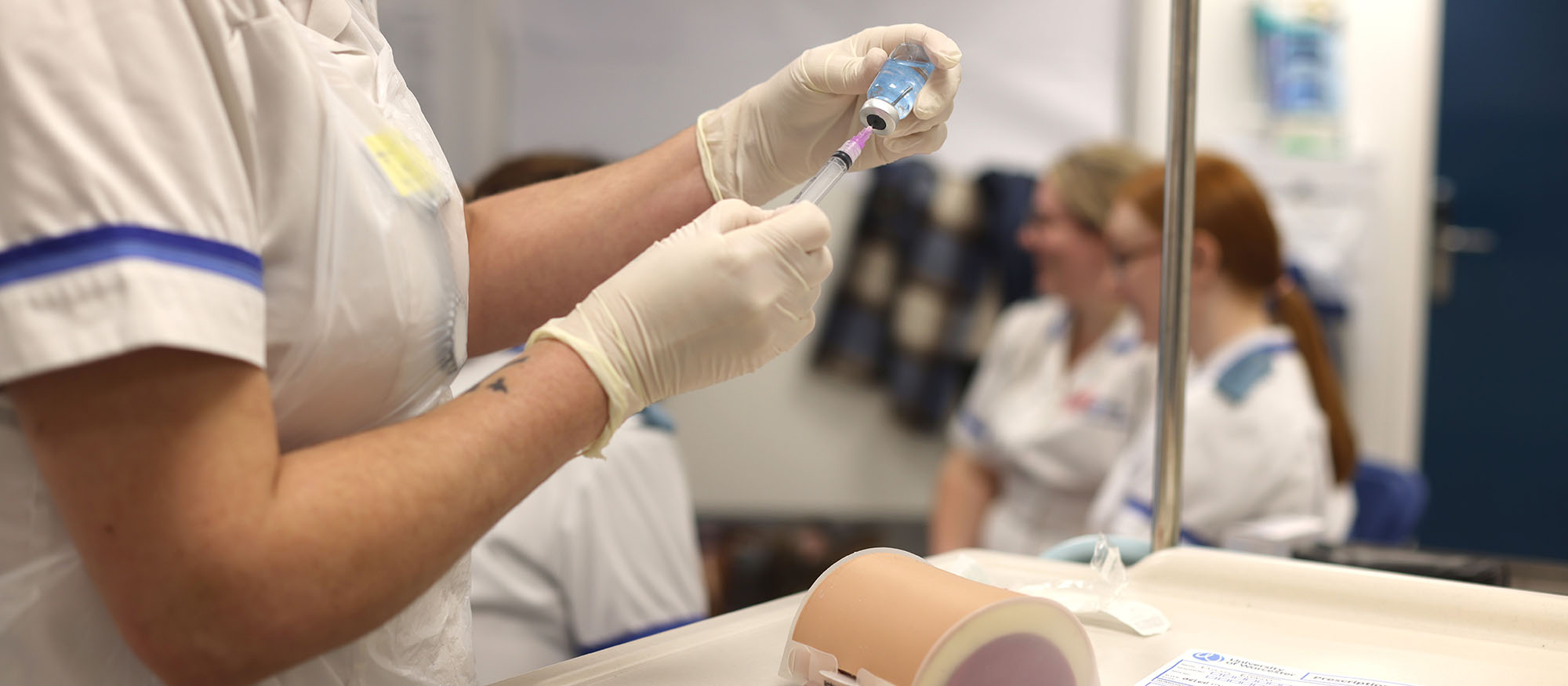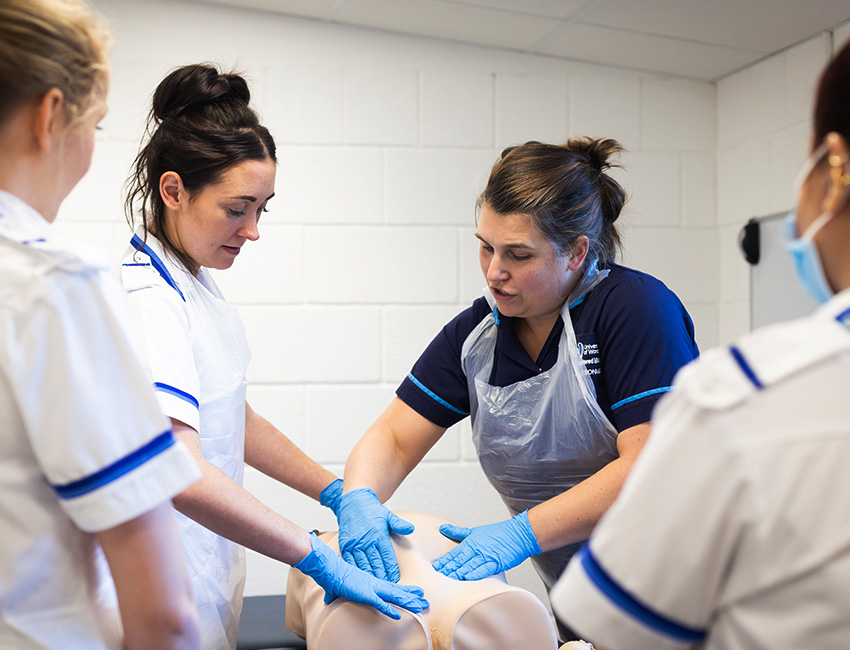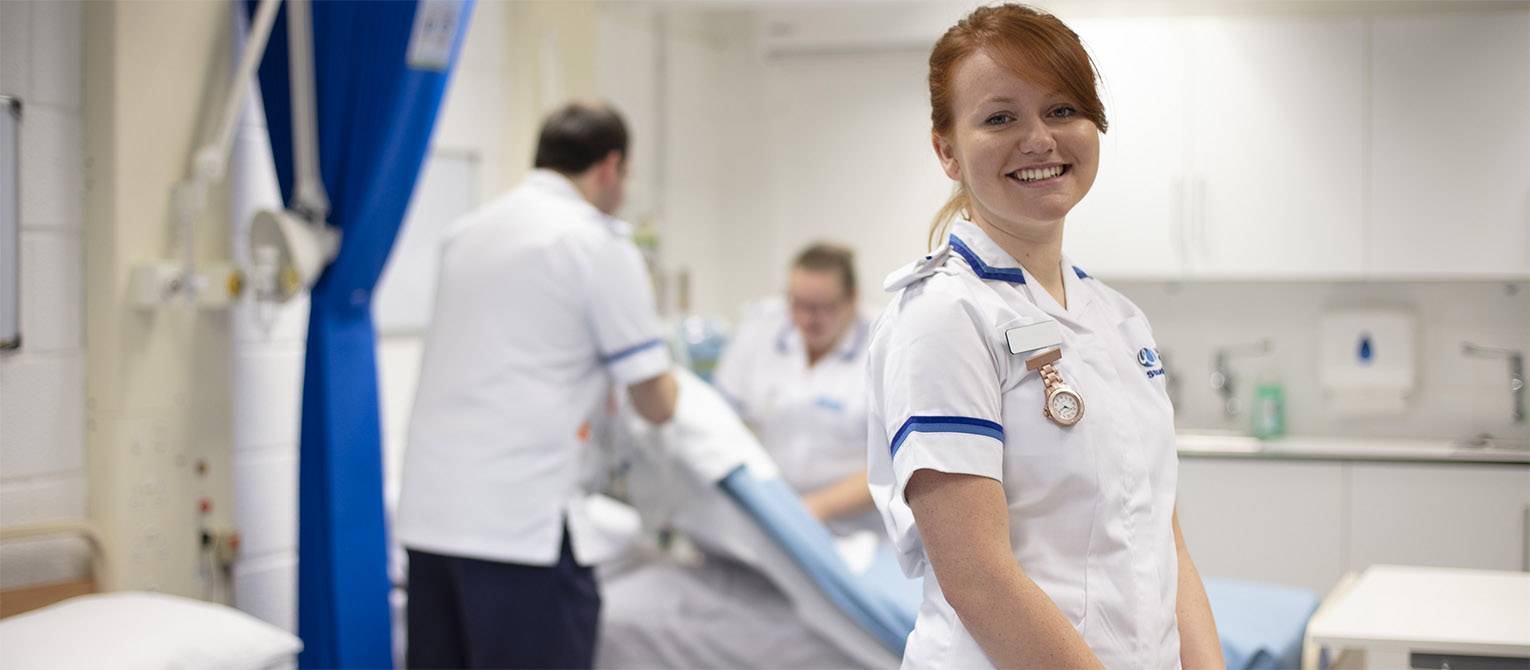Our children's nursing degree is split between learning on campus and developing your skills on placements across the midlands region. You’ll learn the unique physical, emotional and developmental needs of young patients, from newborns to teenagers.
of graduates are in work or further study after 15 months
grant that you won't need to pay back
With this degree you’ll be eligible to register as a nurse with the NMC, the professional regulatory body for nurses.
First for jobs
The University of Worcester is first in the UK for sustained employment, further study or both, five years after graduation (excluding specialist institutions) - Longitudinal Educational Outcomes Survey 2024. Read more.
Overview
Our child nursing degree is taught on-campus through lectures, seminars, and practical skills sessions, and with placements across the region. Throughout the course we place the needs of the child or young person and their family at the forefront of everything we do.
Your lecturers will get to know you personally. They use tailored support and reflections to understand your strengths and they know how to push you to develop throughout your children's nursing degree. When you start, you’ll be assigned a Personal Academic Tutor. Usually this is one of the lecturers teaching on your course and they typically remain with you throughout your studies.
To prepare you for practice you will take part in skills and simulation days. These hands-on sessions take place in our simulation suites which replicate the clinical environment you’ll be working in when you graduate. You'll become confident in different techniques with a range of simulated case studies and clinical scenarios, all designed to give you an authentic insight into the role of a child nurse.
You’ll put your knowledge and decision making into practice with placement opportunities in the community where you will be working with children, young people, and their families. Placement settings include hospitals, day care centres, schools, hospices, clinics and in the community.
Placements
We have excellent links with NHS Trusts and healthcare providers in Worcestershire, Herefordshire, Gloucestershire, Shropshire, Birmingham, and Dudley.
Around half of your time will be spent on practice placements in each year of the child nursing degree. Your placements run in blocks across the year, normally with experiences in at least two different placement settings each year.
While out on placement you’ll learn from experienced nurses and have the support of your tutors. These practical experiences, in combination with your time on campus, prepare you to be a skilled, compassionate, and confident child nurse.
Nursing degree in 60 seconds
Upcoming events
Course content
On this accredited course you’ll study theories backed up by substantial evidence, and then get the opportunity to apply this learning in professional practice.
Our courses are informed by the latest research and developments in the field, as well as feedback from students and employers. Therefore, modules do occasionally change to keep the course up-to-date and relevant.
All modules are mandatory to ensure you’re eligible to register as a nurse with the NMC.
Careers
This course will prepare you for registration with the Nursing and Midwifery Council, so you can begin a rewarding career in children’s nursing.
Most of our graduates go on to work in the NHS – but others find positions in private practices, social services, schools, or choose to work overseas.
In your final year we arrange mock interviews and CV writing workshops, and your personal academic tutor will help you to plan your career. We also invite employers in the region on to campus to meet you and discuss career opportunities.
After graduating, you could become a:
- Children’s nurse
- Health visitor
- Newborn hearing screener
- Children’s counsellor
- Child protection officer
Many of our graduates’ work for local trusts, including:
- Worcestershire Acute Hospitals NHS Trust
- Wye Valley NHS Trust.
- Herefordshire and Worcestershire Health & Care Trust
- Gloucestershire Hospitals NHS Trust
- The Dudley Group NHS Foundation Trust
- Shrewsbury and Telford Hospital NHS Trust
- University Hospitals Birmingham NHS Foundation Trust
Course highlights
Teaching and assessment
Teaching is a mix of interactive seminars, lectures, one-to-one tutorials, and practical skills sessions. Your assessments will help prepare you for a career as a nurse, and include observations of professional skills, writing reflective essays, presenting, group discussions and creating a care plan.
Teaching and assessment contents
You will be taught through a combination of interactive workshops, lectures and seminars. Case studies (developed in partnership with service users) support a scenario-based approach to learning which facilitates small group activities and discussions, leading to shared and individual problem-solving and decision-making. A campus-based approach, complemented by appropriate use of both synchronous and asynchronous online learning including virtual learning environment collaboration, flipped classroom and e-learning packages, which promote personalised engagement with learning.
You will meet with your personal academic tutor 4 times in year one and 3 times in years 2 and 3.
At the core of the nursing programme is learning in a diverse range of clinical placements, learning in the real world which facilitates work-readiness, and personal and professional development. Mandatory practice learning equates to 50% of the programme credit for each year. Your practice learning is mapped across the programme, gradually increasing as you gain confidence, by year 3 you will complete over 55% of the programme in practice learning environments, supporting your transition from student to Registered Nurse. Your placements run in blocks across the year, with experiences normally in a minimum of 2 practice placements each year, in a setting appropriate to your chosen field of practice. The use of ‘spokes’ (visits to alternative placement settings) to maximise learning opportunities offered by diverse and non-traditional settings offers exposure to opportunities to care for people from across the life-span, with mental and physical health needs and learning disabilities. Enhanced practice learning days, rooted in clinical practice, provide opportunities to consolidate learning, provide opportunities for reflection and inter-professional learning, including added value learning experiences and seeking additional support as necessary to promote inclusive learning in the practice setting.
While on placement you are supernumerary and are supported by a practice supervisor and assessed by a practice assessor, both having undergone appropriate preparation for their roles. Further support is provided by the inter-professional team, a nominated person (usually a member of the practice education team) and an academic assessor allocated for each part of the programme. You will have access to the internet and library resources whilst on placement.
You will be provided with the opportunity to complete skills and simulated learning activities. All skills and simulation activities involve a range of people including students, peers, service users/carers, practitioners, technicians, and academics and include role play, ‘hands-on’ practical skills sessions using a range of simulation manikins, video recording and playback. Formative feedback on performance is provided to facilitate safe and effective support for essential skills development, in state-of-the-art simulation suites, replicating hospital and community practice learning environments. This learning is particularly important in Year 1, with 20 days allocated to prepare you for your practice learning experiences. This is reduced in Years 2 and 3 to 10 days per year.
Students have the opportunity to complete a UK or international elective placement, during part three, semester one. This can be either a formative four-week experience or a summative experience, between 6 and 12 weeks, helping with the globalization of the programme and employability. Students have a designated Academic Assessor for each part of the programme, in line with the NMC (2023) Part 2: Standards for student supervision and assessment.
Student story
Entry requirements
UCAS tariff points required: 112
| Qualification | Grade |
|---|---|
| A-level | BBC |
| BTEC National Extended Diploma | DMM |
| T-level | Merit |
We do accept Access to HE Diplomas and other qualifications which may not exactly match the combinations above. Work out your estimated points with the UCAS tariff calculator.
Any questions?
If you have any questions about entry requirements, please call our Admissions Office on 01905 855111 or email admissions@worc.ac.uk.
Fees
Fees contents
UK and EU students
The Government has announced that it will increase tuition fees and maintenance loans by 3.1% from the 2025/26 academic cycle. Subject to approval, the University intends to increase our tuition fees in line with this and as per our terms and conditions. This means that from September 2025 the standard fee for full-time home and EU undergraduate students on BA/BSc/LLB degrees and FdA/FdSc degrees will be £9,535 per year for new and continuing students.
For more details on course fees, please visit our course fees page.
International students
The standard tuition fee for full-time international students enrolling on BA/BSc/LLB degrees and FdA/FdSc degrees in the 2025/26 academic year is £16,700 per year.
For more details on course fees, please visit our course fees page.
How to apply
How to apply contents
Applying through UCAS
UCAS is the central organisation through which applications are processed for full-time undergraduate courses in the UK.
Read our how to apply pages for more information on the application process, or if you’d like to apply for part-time study.
Contact
If you have any questions, please get in touch. We're here to help you every step of the way.
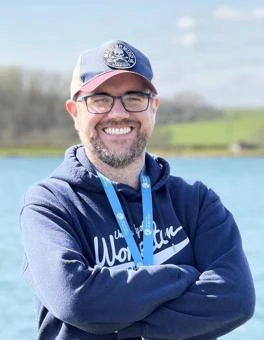
Jodie Walker-Haywood
nursingadmissions@worc.ac.ukAdmissions Office
admissions@worc.ac.uk01905 855111More to explore
Open Days
Visiting us is the best way to get a feel for student life at the University of Worcester.

The City of Worcester
Worcester is a welcoming university city with great transport links and plenty of student parking.

Accommodation
Benefit from our accommodation guarantee. We have rooms on campus to suit every budget including en-suite options.

